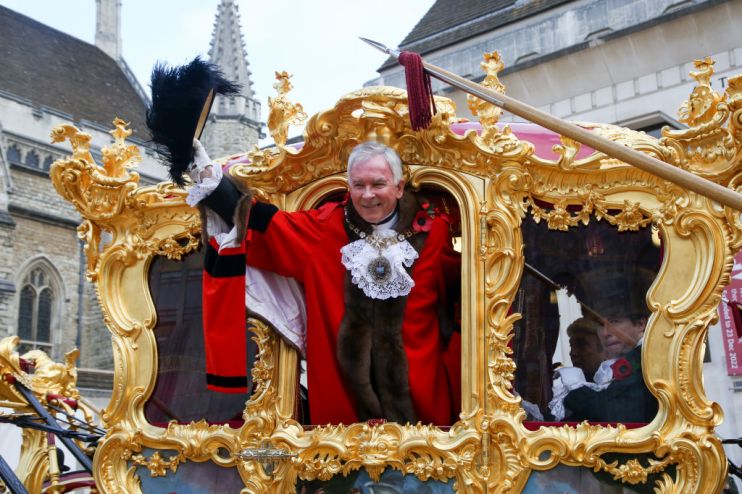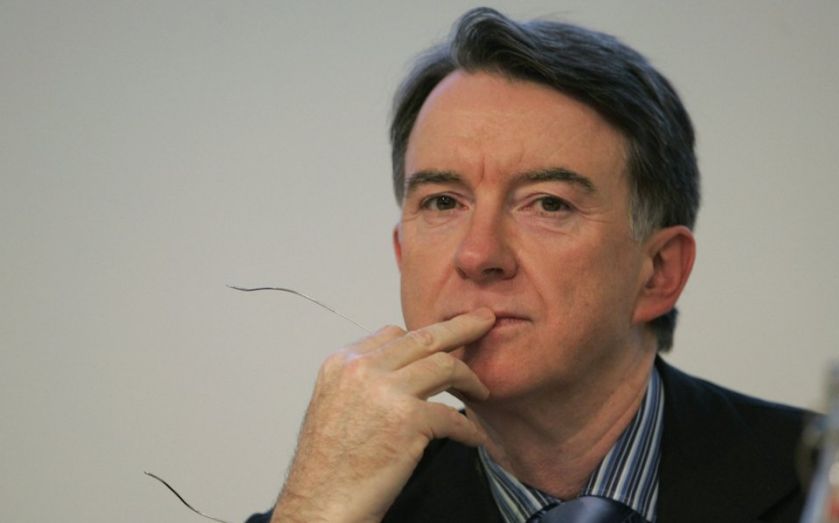Lord Mayor Nicholas Lyons: I will miss doing this, but I’ll love being out of the public eye

Draped over a mannequin at the back of the Lord Mayor of London’s office at Mansion House is his ceremonial robe, lined with fur lapels and fastened with a gold neck chain. The Lord Mayor himself, Nicholas Lyons, works behind a wide wooden desk on a thick red carpeted floor with a fireplace in the corner.
The evening before we speak, Lyons welcomed hundreds of guests to Mansion House’s Egyptian Hall for the regulators’ dinner, where bosses of the City’s watchdogs addressed a room full of black tied grandees. Now, staff are cleaning the carpets once again for a visit from the King the following day.
Even as it represents one of the world’s most advanced financial centres, this is an office steeped in its ancient and most exclusive traditions.
Lyons has served as the City’s 694th Lord Mayor since November last year and is winding up his final weeks of duties before handing over the reins next month. As he prepares to shift back into the reality of the wider Square Mile in his role with pension giant Phoenix, he says he has mixed emotions.
“I will miss doing this, but I will love being out of the public eye,” he tells City A.M. in his office at Mansion House. “Not having to – with all due respect – talk to journalists all the time, where one misstatement and I’m going to have another bad headline.”
Convening power
Dressed without his robe in a sharp black suit, Lyons is a reminder of a career outside Mansion House.
His has been a long one stretching across the Atlantic and touching every area of the financial industry from money managers to banks and now pension firms. That varied history has helped him take a different tack than his predecessors.
After ascending to the office in a gold gilded carriage, there may be a temptation to just enjoy the trappings. But Lyons has delved into a deep contact book to leverage the galvanising power of the Square Miles top movers and shakers.
“Whenever I’ve needed to convene, it’s just a few phone calls to people that you’ve known most of your professional life, who are chairman and chief executives of these organisations,” he says.
The plan from the outset for his mayoralty, he says, was drawn up with an overarching theme in mind – “financing our future”. To that end he has set about clashing heads together and lobbying the City’s big investors to put their money to use.
One element within that has dictated his direction more than others. Undoubtedly Lyons’ biggest win has been in bagging a non-binding commitment from nine of the City’s biggest pension money managers to pump five per cent of their assets into unlisted start-ups by 2030, in a bid to fill a dearth of growth capital available to growing UK firms.
The Mansion House Compact, as it is known, won the seal of approval from the Chancellor, and Lyons is now looking to build on it with a £50bn private sector-led pooled pension fund to fuel a wave of growth among technology firms.
So much of the entrepreneurship that we are so great at in this country ends up with huge ownership from foreign sophisticated investors
Despite the hopes of many for a quick burst of growth capital for the City, he warns there is still a long way to go before the fabled wave of cash is unleashed.
“We’ve only got one technology company in the FTSE 100 [software firm Sage] and I think the proof of the pudding of what we’re trying to do with the Mansion House compact and what I’m proposing as a future growth fund […] will be in five years, 10 years time, whether we’ve got five or 10 technology companies in the FTSE 100 with £10bn, £20bn, £50bn pound valuations,” he says.
Tricky times
The comments point to the troubling backdrop of his mayoralty. The City of London has been plunged into something like a period of soul-searching over the past year as policymakers and regulators look to breathe life into its floundering capital markets and begin tempting more firms to market.
Just 23 firms have listed in the UK in the first three quarters of this year, raising £953m, compared to 34 IPOs raising £1.16bn over the same period of an already quiet 2022. A flow of firms have shelved IPOs or threatened to swap their listings for the other side of the Atlantic, and tech firms have bemoaned their lacklustre valuations and conservative investors in the capital.
Reform efforts are underway as the Financial Conduct Authority pushes through a wave of regulatory tweaks to ease the listing process. But he says the problem lies further down the food chain, where foreign investors are more willing to swoop in and take a punt on our early-stage companies.
“So much of the entrepreneurship that we are so great at in this country ends up with huge ownership from foreign sophisticated investors, leading – not inevitably – but in many cases to a listing abroad,” he adds.
“There’s huge value being created. But it’s not manifesting itself in our market.”
The atmosphere that surrounds the Square Mile has also not been one welcoming firms to the market, he argues. Lyons, like a host of other City figures over the past few months, holds the media as somewhat accountable for the widespread feeling of gloom.
“The journalists only want to talk about things that go wrong.”
Doom and gloom
Tellingly, perhaps, Lyons has found himself in appropriate company for combating the narrative.
Peter Mandelson, known as the ‘Prince of Darkness’, offered a word of advice to the Lord Mayor – relentlessly bang the drum for the City and the mood may eventually shift.
“Peter Mandelson said to me before I became Lord Mayor at a dinner party, ‘a word of advice as a communicator, it’s only at the point at which you are so fed up of hearing yourself saying the same thing that your message will start landing’.”

Political buy-in
Lyons in some regard has taken that advice and run with it. The chancellor and City ministers on both sides of the political aisle have picked up the Lord Mayor’s messaging with vim, including throwing their weight behind the mansion house compact and Future Growth Fund.
His says engagement from the opposition has been as encouraging as that of the government, and parties on both sides are beginning to back the idea of the City as an economic engine room.
“I set myself privately a target in the course of my year in office to have one politician say something good about the City of London,” he says. “But of course, what’s happened in this year is we’ve had huge engagement with the government in trying to mobilise pension money to help stimulate the growth economy. But we’ve also had great engagement from the Labour Party.”
Lyons will be comfortably out of office and by the time a general election comes round. But as chair of the UK’s biggest pension fund though he won’t exactly be shouting from the sidelines.
For now though he has a month left to serve in post and plenty of ceremonial duties to finish off before stepping back into the world of UK PLC.
A knock at the door sounds at Lyons’ office. The next appointment is here. What’s on the agenda?
The 700-year-old Worshipful Company of Fruiterers has gathered outside to offer their annual presentation of fruit.